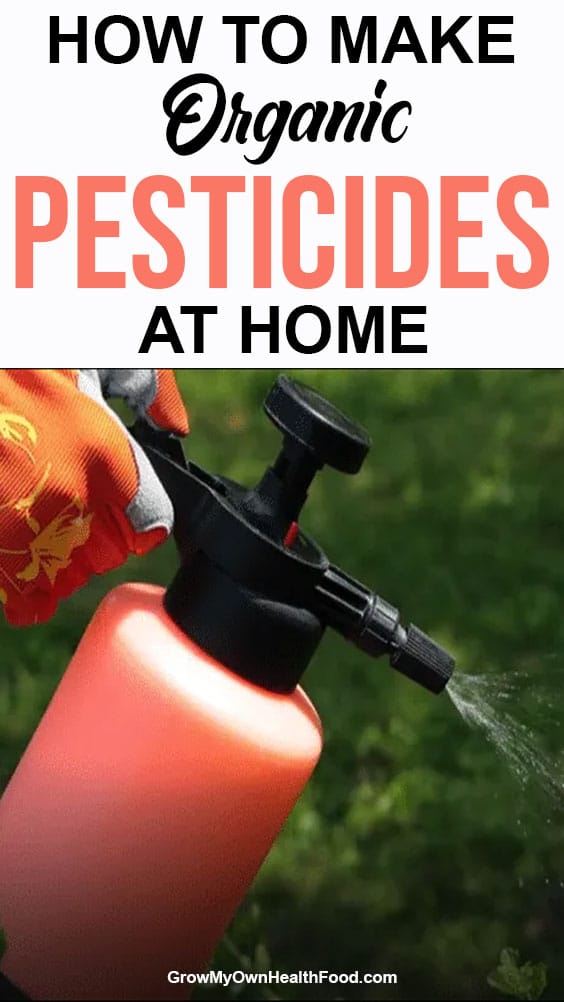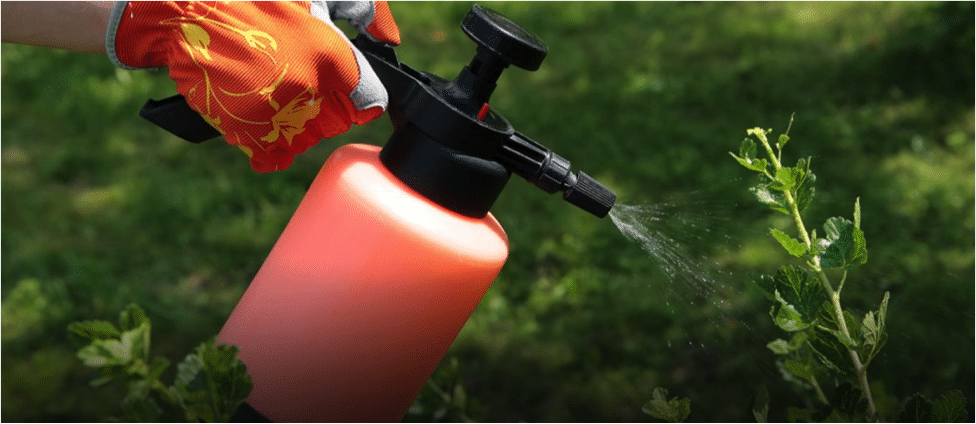Making organic pesticides at home is easier than you think. However, what could be easier than walking into you garden center and buying something off the shelf? Well, let’s talk about that a bit.
Pest control is an essential task for the home gardeners to keep insects away from feasting on garden plants. However, chemical pesticides contain toxic substances that can leave the residual effect on your plants.
Their usage is not only harmful to the environment, but also for your pets and children. Imagine what will happen if your child touches the attractive foliage that is chemically sprayed, and then eat something with these hands! It can really put you in a serious situation.
Thankfully, the concept of organic gardening puts the question in the minds of many gardeners on how to control insect infestation organically at home? The answer is, “you can make an effective and efficient organic pesticide by using natural things that are generally present in your home.”
To make organic pesticides at home is not only an easy task but also way cheaper and safer than many products you buy from store shelves. Garden pests can be killed by using these natural products; let’s take a look at some organic insecticide recipes that you can make for your home garden.
Neem Oil Pesticide Spray
Neem oil is well known for its medicinal properties. Its bitter taste and strong odor are a powerful tool to keep the insects away from your plants. Its application is non-toxic to plants, birds, animals, and humans. Neem extract is considered a powerful natural pesticide that can disrupt the life cycle of insects at all stages, making it an excellent resource for an organic gardener.
To make a neem oil natural insecticidal spray, take 2 teaspoons of good-quality organic neem oil and 1 teaspoon of mild liquid soap. Mix it thoroughly in warm water equal to 4 cups. Pour this mixture into a spray bottle and then spritz on the affected plant foliage.
On young plants, the spray of this organic insecticide can remain effective for about 3 weeks. You can also spray it as a preventive measure before the actual infestation occurs.
- 100% Neem Oil, Cold pressed Unfiltered and Undiluted
- BEAUTIFUL SKIN Great for minor skin irritations as well as nourishing healthy skin.
- SCENT. 100% pure Neem Oil has a unique earthy scent. Some people consider the scent unpleasant. You only need to blend a small amount into shampoo or lotions for skin care and hair care needs.
- PLANTS. Wonderful for plants and home gardening
- RICH in Omega 6 & 9 Fatty Acids
Prices pulled from the Amazon Product Advertising API on:
Product prices and availability are accurate as of the date/time indicated and are subject to change. Any price and availability information displayed on [relevant Amazon Site(s), as applicable] at the time of purchase will apply to the purchase of this product.
Chili Pepper Pesticide Spray
You can make an effective natural insecticide from chili pepper at home. It can work as a repellentand can control a variety of different pests that are commonly present in your home garden. You can make it either from chili pepper powder or fresh hot peppers.
How to make it:
To make this insecticide spray, you need 1 tablespoon of pepper powder in water equal to four cups. Now, mix the solution by adding several drops of mild liquid soap. You can use this mixture on the leaves of affected plants.
You can also make this insecticide from fresh chili peppers; blend a half cup of fresh peppers with one cup of water. Then add another 4 cups of water and bring it to boil. Wait until the chilies particles settle in the bottom, and then strain. Now add a few drops of liquid soap in this mixture and spray on required areas.
Precautions: Make sure to wear gloves while making this insecticide because it can irritate the skin. Keep this spray away from eyes, nose, and mouth.
- PROTECT YOUR HANDS AND ARMS FROM SCRATCHES AND PUNCTURES. 2x more protection against punctures than regular leather gardening gloves, NoCry gloves have reinforced, double layered natural goatskin leather fingertips and palms + long flared gauntlet cuffs made from thick cow split leather.
- DESIGNED FOR COMFORT, FLEXIBILITY, AND FIT. The extremely soft and supple goatskin leather provides ease of movement while giving you the feeling of wearing a fine driving glove.
- USE IN AND OUT OF THE GARDEN. High tensile strength goatskin leather makes these versatile thorn proof gloves perfect for trimming and cutting hedges and cactus, pruning roses and blackberry bushes, pulling weeds and thistles, as well as handling birds, animals, and barbed wire. Also offers protection against sparks and is suitable for light-duty welding.
- TAILORED TO FIT BOTH WOMEN AND MEN. Available in 3 size options to fit the hands of men and women easily.
- BACKED BY THE NOCRY GUARANTEE. NoCry stands behind every item we make. If theres an issue with your gardening gloves, well make it right by replacing them or giving your money ba
Prices pulled from the Amazon Product Advertising API on:
Product prices and availability are accurate as of the date/time indicated and are subject to change. Any price and availability information displayed on [relevant Amazon Site(s), as applicable] at the time of purchase will apply to the purchase of this product.
Tomato Brew Pesticide
Tomato plants contain “tomatine,” alkaloid, which can provide efficient control against aphids, grasshopper, whitefly, and other insects.
How to make organic pesticides:
To make this natural insecticide, take two cups of chopped fresh tomato leaves (from the bottom part of the plant). Soak them into water equal to 4 cups for a couple of days. Strain the plant material and spray this insecticide onto the effected plant foliage.
Onion Insect Repellent
When you peel the onions for kitchen use, save all its offcuts like peel, skin, and ends in a zip lock bag and then refrigerate it to keep smells at bay. Once you have gathered enough, soak them in warm water for a few days to a week. With the help of a strainer, strain the mixture and pour the liquid in a spray bottle.
You can spray the onion insect repellent both on your house and garden plants to control aphids and other pests. Bury the strained onion leftovers around vegetation prone to the spiders, aphids, and other pests attack; it will keep them away.
- Features our Easy Open Tabs
- The smaller sandwich bags make for great grab-and-go snacking
- Ideal for packing sandwiches, pizza slices, subs, cookies, fruit, carrot sticks, chips and more
- Use these handy food storage bags to pack lunch for yourself and your family or just to keep snacks fresh and accessible
- Reusable and great for meal p
Prices pulled from the Amazon Product Advertising API on:
Product prices and availability are accurate as of the date/time indicated and are subject to change. Any price and availability information displayed on [relevant Amazon Site(s), as applicable] at the time of purchase will apply to the purchase of this product.
Garlic, Pepper, and Onion Pesticide
You can enhance the effectiveness of homemade insecticides by combing the different ingredients that have been described above separately. Take 1 whole bulb of garlic, 3 hot peppers, and 1 large onion. Make its puree in the food processor by adding 1/4 cup water.
Mix the puree in one-gallon hot water and leave it for a day. Strain and spray it on your vegetable garden, roses, and azaleas to kill bug infestations. It provides good control against grasshoppers, thrips, aphids, chewing, and sucking insects.
Bury the stained material in the ground where insect attack is heavy. The pungent smell of onion and garlic helps keep insects away. This organic insecticide spray will hold its potency for a week if you keep it in the refrigerator.
- 2 PACK - UV PROTECTION - protects against degradation from ultraviolet light and keeps your essential oils safe plus the glass is not affected by strong oils like citrus. BPA and LEAD FREE.
- 2 PACK - GREAT DESIGN fits in your hand but is large enough that you will not have to constantly refill. Looks great and is sturdy with a reliable squeeze trigger sprayer. Includes 2 CAPS and 4 SALLYS ORGANICS LABELS.
- SAVE MONEY, help the environment, and reduce plastic chemicals in your house with a clean chemical free reusable mister for all your liquid sprays
- REFILL with whatever you make at home. Unlimited uses include mixing your own cleaners, spraying plant like succulents or herbs, home linen spray for ironing, hair moisturizing spray, non-toxic bug spray, pet sprays for fleas or odor, natural air freshener for the house, floor or carpet cleaner, vinegar and water mixture for cleaning windows, cosmetic face moisturizer, washing vegetables, bathroom deodorizer and homemade skin and beauty recipes.
- GUARANTEED for life because of its durability. ORDER ONE NOW and If you are not absolutely satisfied for any reason, simply contact us and we will happily refund your mon
Prices pulled from the Amazon Product Advertising API on:
Product prices and availability are accurate as of the date/time indicated and are subject to change. Any price and availability information displayed on [relevant Amazon Site(s), as applicable] at the time of purchase will apply to the purchase of this product.
Eucalyptus Oil
You may already have eucalyptus oil lying somewhere in your home. Its strong smell makes it a great natural pesticide for flies, wasps, and bees. You just need to sprinkle the few drops of eucalyptus oil on the affected area to deter insects and bugs. Make sure to use it regularly; this way, the insects will all be gone in no time.
Organic Pesticide Considerations
- Always test an organic pesticide spray on a leaf or small area before applying it to the entire plant, to make sure that it doesn’t damage the foliage.
- The best time to spray your plants is early in the morning or late in the evening (avoids applying on a hot or windy day).
- Don’t use any bleach-based soap or detergent in making the organic pesticide, since this can be harmful to the plants.
- The application of these organic pesticides is mostly effective for a week or two.
- Avoid the excessive use of these pesticides as it can affect the foliage and kill the beneficial insects for your garden (honeybees, ladybugs, etc.).
- Besides applying these organic pesticides, introducing other predatory insects (ladybugs, praying mantis, etc.) and building soil fertility is also an effective and integrated pest management approach.
Make Organic Pesticides at Home Conclusion
- These natural pesticide recipes are economical and easy to make.
- They are as effective as commercially available products in the market.
- No expensive items are required; everything you need is most likely stocked in your home.
- Most of the ingredients used in making them are natural and non- toxic.
- As you notice, the signs of pest attack begin the treatment, the sooner you start, the easier it will be to control their infestation.
- The best method to control pests in the garden is to keep your plants healthy by fertilizing them when needed and removing weeds, so they don’t attract bugs.







